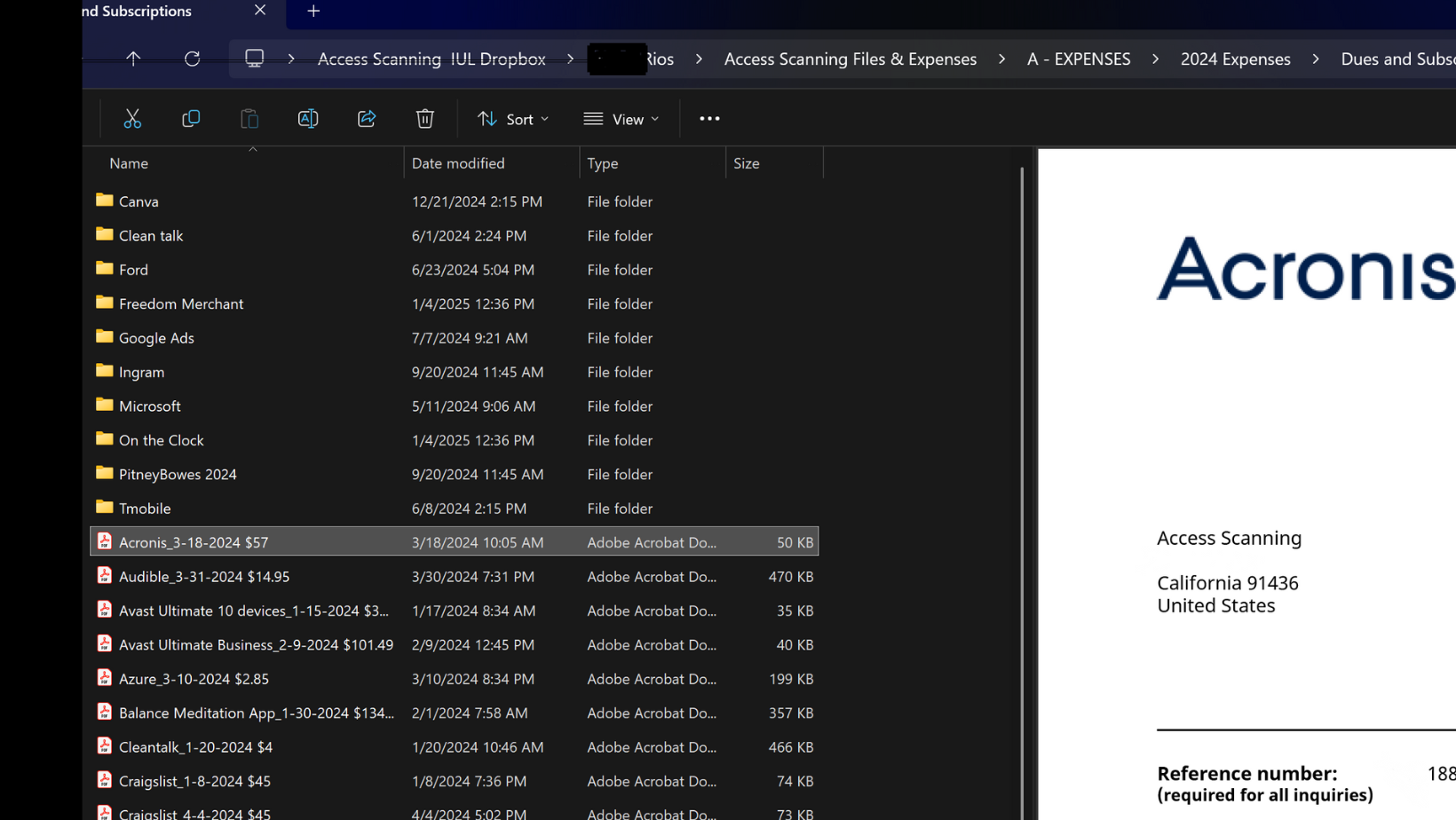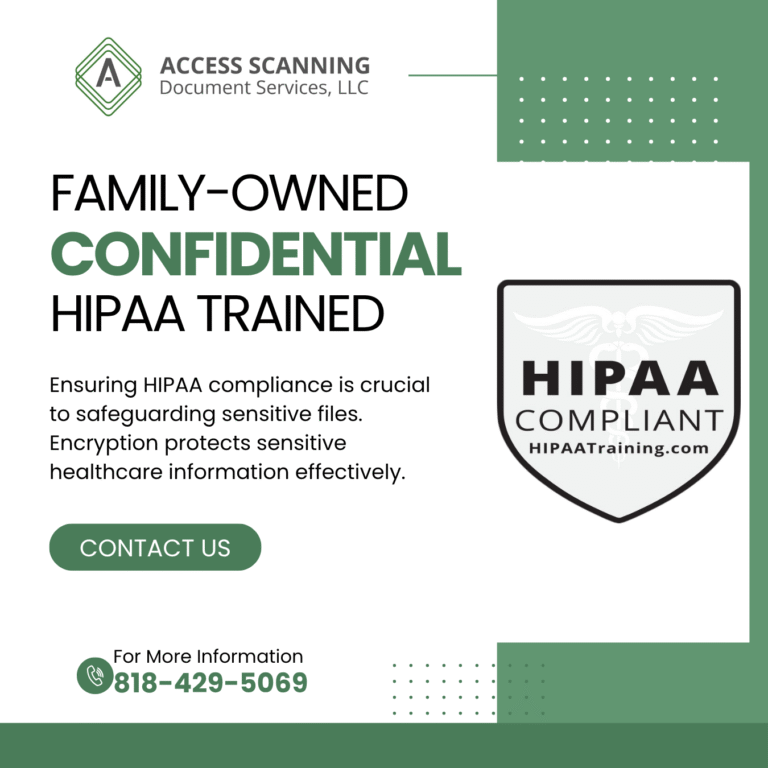Medical Document Scanning Services for Medical Offices
See the difference of the before and after, a solution for your DIGITIZING needs!


Medical Document Scanning Services for Medical Offices: Secure Medical Scanning brings more than efficiency to business. For medical offices, scanning documents enhances chart management by simplifying how files are stored, tracked, and retrieved. This process not only conserves time but also ensures that sensitive client data remains secure yet readily available to those with permission. Picture having a digital archive of your key documents at your disposal, perfectly prepared for upcoming patients emergencies or legal cases!
When it comes to the medical field, where comprehensive patient records are routine, scanning digitalizes the cumbersome paper files, thereby improving patient care through secure electronic records. Healthcare professionals can quickly access and amend patient data, which advances service quality while cutting down on administrative tasks.
Moreover, embracing digital methods positively impacts sustainability. Reduced paper consumption equates to less deforestation, and without heaps of paperwork filling up office spaces, there’s more room to breathe. Thus, whether you’re advocating for clients or attending to patients, document scanning propels your practice toward a more organized, efficient, and environmentally sustainable future! 🌍📄💻
In the modern era, where document scanning is key to efficiency and environmental sustainability, law offices and medical businesses are increasingly turning to legal document scanning. A well-organized and secure method of documentation not only streamlines operations but also ensures compliance with regulations such as the Health Insurance Portability and Accountability Act (HIPAA) in healthcare and various privacy and confidentiality laws in the legal field. Here’s why businesses in these sectors should invest in document scanning services.
**Regulation Compliance**: Perhaps one of the most significant drivers for document scanning in both law offices and medical businesses is the need to comply with regulatory requirements. In the medical field, HIPAA dictates that patient information must be securely stored and easily accessible to authorized personnel. Similarly, law offices must comply with laws ensuring client confidentiality and data protection. Digital scanning of documents facilitates easy compliance with these rigorous standards, providing the tools necessary for secure data storage and retrieval.
**Efficiency and Accessibility**: When physical documents are scanned and stored digitally, they become far easier to access and organize. For law offices, this translates to streamlined case management and the ability to rapidly retrieve essential documents during litigation, hearings, or client consultations. For medical businesses, digitized records allow healthcare providers to quickly access patient histories, lab results, and billing information without sifting through filing cabinets. This efficiency leads to reduced administrative workload, enabling professionals to devote more time to client and patient care.
Essential tools are needed for Efficiency, such as:
**Space and Cost Savings**:
In the fast-evolving world of healthcare, efficient management of information is critical. As the medical industry grows, so does the volume of paperwork. Enter: medical document scanning. This transformative technology is helping medical businesses transition from cumbersome paper records to streamlined, digital documentation. Here are the key benefits of embracing medical document scanning for your medical business:
1. **Enhanced Efficiency and Productivity:** Say goodbye to days spent rifling through stacks of paperwork. Digital scanning significantly enhances efficiency by enabling quick retrieval of documents. With a few clicks, healthcare professionals can access patient information, billing records, and other essential documentation from anywhere, anytime. This leads to faster decision-making and allows medical staff to focus on providing quality patient care instead of administrative drudgery.
2. **Improved Patient Care:** At the heart of medical document scanning is the patient. When medical staff have immediate access to comprehensive patient records, they can deliver more informed, timely care. Scanned documents can be easily shared with other members of the healthcare team, ensuring everyone is on the same page. This seamless flow of information helps in reducing errors, avoiding unnecessary tests, and ultimately leads to better patient outcomes.
3. **Data Security and Compliance:** Keeping sensitive patient information secure is paramount. Medical document scanning employs advanced encryption and access controls, ensuring that only authorized personnel have access to records. Moreover, digital archiving ensures compliance with regulations like HIPAA, which mandate stringent guidelines on patient data protection. With robust security measures in place, you can safeguard patient information from unauthorized access, data breaches, and physical damage.
4. **Cost Reduction:** While the initial investment in scanning technology may seem daunting, the long-term savings are significant. Digital records eliminate the need for physical storage space, reducing costs associated with storing, archiving, and maintaining paper documents. Additionally, the reduction of errors and improved efficiency minimize financial losses associated with misplaced or misfiled records.
5. **Disaster Recovery and Business Continuity:** Relying solely on paper records leaves your business vulnerable to disasters like floods, fires, or other unforeseen events. Scanned documents can be backed up and stored off-site or in the cloud, ensuring your data is protected and easily recoverable in case of an emergency. By ensuring continuous access to critical documents, you enhance your business’s resilience against unexpected disruptions.
6. **Environmental Impact:** Transitioning to a paperless environment significantly reduces the carbon footprint of your medical business. By scanning and digitizing records, you contribute to the conservation of natural resources and minimize waste. Moreover, staff and patients alike can engage in greener practices, reinforcing your organization’s commitment to sustainability.
7. **Scalability and Future-Proofing:** As your medical business grows, so does the volume of data. Digital document management systems are scalable, allowing seamless integration as your needs evolve. With medical document scanning, you future-proof your business against the ever-changing technological and regulatory landscape.
In essence, the adoption of medical document scanning is not just about convenience but about transforming the very core of how medical businesses operate. It empowers healthcare professionals to work smarter, not harder, ensuring patient care is the priority while operational efficiency and security are enhanced. Embrace the future of medical documentation today, and take the crucial step towards a more efficient, secure, and sustainable business.
Maintain your Medical Charts up to date!
Efficiently maintaining medical document scanning processes is crucial for any thriving medical business. Implementing effective strategies and staying organized ensures swift access to patient information, compliance with regulations, and improved operational efficiency.
1. **Hire a reliable contractor**: Choose reliable, HIPAA-compliant partner designed specifically for medical document management. This ensures that your data is secure and easily retrievable. High-quality scanners are essential to produce clear, legible digital copies of important documents.
2. **Organize Scanning Workflow**: Create a streamlined process for scanning documents as soon as they arrive. Assign responsibilities to specific staff members who ensure documents are scanned, categorized, and stored correctly. This prevents backlogs and errors.
3. **Train Your Team**: Consistent training in document scanning protocols and compliance policies is crucial. Ensure that your staff understands the importance of accuracy and privacy in handling patient documents.
4. **Regular Audit and Compliance Checks**: Schedule routine audits of your scanned documents and procedures. Double-check that all processes align with current healthcare regulations, ensuring data remains secure and compliant.
5. **Cloud Integration**: Use cloud storage solutions to allow for secure, remote access to scanned documents. This facilitates teamwork and flexibility while maintaining security.
6. **Backup Strategy**: Implement a reliable backup strategy to prevent data loss. Regular backups protect your business from potential technical failures.
Stay ahead by adopting these proactive measures, optimizing your medical document scanning process, and transforming operational challenges into opportunities for growth and excellence. Let your patients feel the difference in service that a well-managed system can bring!
